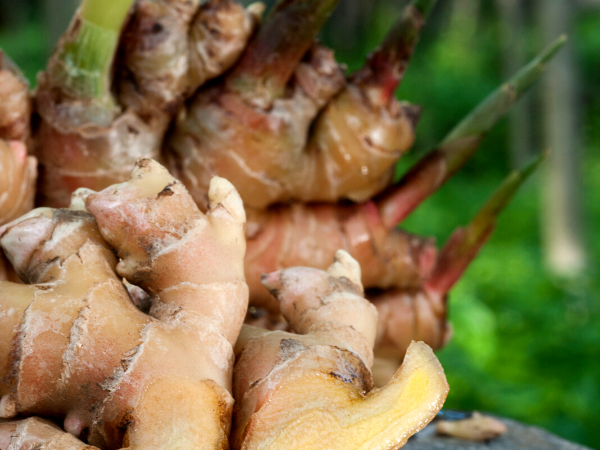
Ginger (Zingiber officinale Roscoe) has an ancient tradition of use. In particular, its use in food, as a spice and as a medicinal remedy to support digestive functions is well established. Probably has originated in South-East Asia. Then it has been part of traditional Eastern and Western systems of medicine for centuries.
Botany
Ginger is an herbaceous perennial plant that belongs to the Zingiberaceae family. It grows to a height of up to 1 metre. It has alternate, elongated leaves that can be up to 30 cm long and have a stalk that hugs the stem. The flowers range in colour from yellow to purple, and form spikes. Fleshy rhizomes with a characteristic scent and yellow when cut grow underground.
It is a plant native to India and South East Asia is well known in Eastern medical systems since ancient times. The earliest documentation dates back to Chinese phytotherapy manuals from 400 BC. The first importation of ginger into the Western world dates back to around the 1st century AD via the Spice Route, which connected India to the Arab world and thus to Europe.
Ginger Properties
You can use Ginger for its eupeptic, anti-emetic, cholagogic and anti-inflammatory properties. Specifically, the rhizome is used. This contains fibre, varying proportions of essential oil and oleoresin. The scent of ginger is due to zingiberene and bisabolene, while the spicy flavour comes from the volatile terpenes of the essential oil, gingerols and shogaols. It is to these molecules that its beneficial properties are attributed. The US FDA has classified ginger as GRAS (Generally Recognised As Safe) and no adverse effects have been reported.
Where to find Ginger
For its digestive and beneficial properties on the gastrointestinal tract, we have included ginger rhizome powder in BIOintestil®. It is a mixture of palmarosa essential oil (Cymbopogon martinii) and ginger rhizome powder (Zingiber officinale Roscoe). This raw material is perfect for the formulation of food supplements with eubiotic action and to improve digestive functions.
On patients who suffer from Irritable Bowel Syndrome (IBS), BIOintestil® has shown to positively modulate the intestinal microbiota. In addition, it provides relief from the typical symptoms of IBS. Among these the most frequent are pain, abdominal bloating, irregular bowel movements, poor digestion and nausea.







